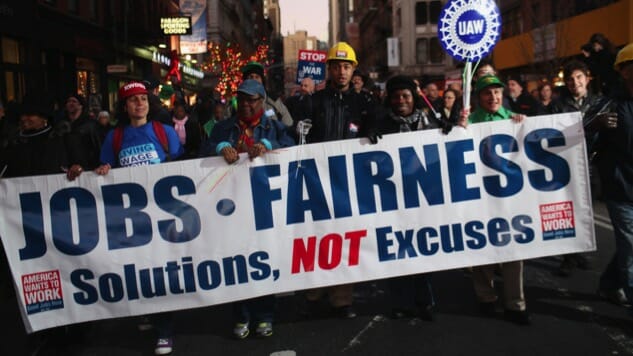Advice to Struggling Democrats: Ditch the Celebrities, Embrace the Unions
Photo by Spencer Platt
“A paradox of American politics,” wrote the journalist Thomas Edsall in 2014, “is that Republicans take organized labor more seriously than Democrats do.”
This insight has perhaps never been so accurate—or so consequential. Last month, The New York Times reported that Republicans at the state level are moving quickly to crush what is left of organized labor, taking advantage of their unprecedented power in states from Iowa and Missouri to New Hampshire and Kentucky.
Indeed, “move quickly” has become something of a motto for reactionaries looking to make the most of their advantageous position.
Contrasted with the tumult and confusion currently rattling the national Republican party, the Times notes, “rising party leaders in the states seem far more at ease and assertive,” eager to use their “top-to-bottom control in 25 states . . . to enact longstanding conservative priorities.”
While the list of “conservative priorities” in the age of Trump is long, one has consistently remained at the top of the heap.
Though often cloaked in pro-worker garb, the Republican Party’s desire to dismantle the labor movement—thus ensuring the preeminence of corporate power—has, over the last several decades, never faltered.
In his infamous 1971 memo, penned just months before his ascent to the Supreme Court, Lewis Powell urged business to go on the offensive, to meet challenges to its hegemony with sustained force.
He disparaged a state of affairs in which “businessmen have not been trained or equipped to conduct guerrilla warfare with those who propagandize against” what he termed the “American free enterprise system.”
Portraying business as a helpless giant withering under sustained assaults by “Communists, New Leftists and other revolutionaries,” Powell issued a call to arms. Business, he urged, must take on “a more aggressive attitude” and exert its influence on the courts, the media, and the political system.
Powell even recommended that business leaders learn from those they were setting out to destroy. “Lessons can be learned from organized labor,” he wrote. “The heads of national labor organizations have done what they were paid to do very effectively.”
Of course, Powell’s description of corporate America as a cowering victim was self-serving and inaccurate, as was his over-inflation of the strength of progressive forces challenging it. Nonetheless, the memo served as a rallying cry that did not go unheeded.
-

-

-

-

-

-

-

-

-

-

-

-

-

-

-

-

-

-

-

-

-

-

-

-

-

-

-

-

-

-

-

-

-

-

-

-

-

-

-

-








































